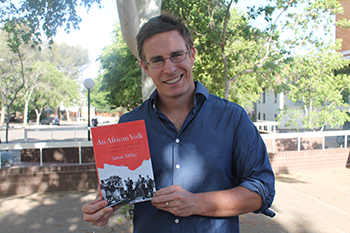Latest News Archive
Please select Category, Year, and then Month to display items
07 March 2024
Photo Lunga Luthuli
 Prof Francois Strydom, Senior Director at the Centre for Teaching and Learning and Simphiwe Kunene, the first African DREAM scholar and a master’s student from the Faculty of Education.
Prof Francois Strydom, Senior Director at the Centre for Teaching and Learning and Simphiwe Kunene, the first African DREAM scholar and a master’s student from the Faculty of Education.
The University of the Free State (UFS) received recognition for its commitment to student success at the 2024 Achieving the Dream (ATD) conference which celebrated its 20-year anniversary. Simphiwe Kunene, an Education master's student originally from the Qwaqwa campus, was selected to represent South Africa as the first DREAM scholar from Africa as part of the conference.
The Achieving the Dream network of over 300 institutions, which is one of the largest movements in US higher education aims to transform colleges and universities so that students of colour and a lower socio-economic status are supported to earn a degree. The UFS is a leading partner in the Siyaphumelela Network, which has been working for 10 years with ATD to enhance the success of students in South Africa. Prof Francois Strydom, Senior Director at the Centre of Teaching and Learning (CTL), accepted the award on behalf of the institution.
Prof Strydom said that collaboration with the ATD and Siyaphumelela institutions has helped the UFS to develop cutting-edge approaches to “level the playing field” and support Kovsies to earn their undergraduate degrees.
The first African DREAM scholar
Kunene was selected as the first African DREAM scholar from the Siyaphumelela network. To select the DREAM scholar, each Siyaphumelela partner institution nominated one student as a preferred candidate. From the proposed candidates, the DREAM scholar was selected by the South African Institute for Distance Education (Saide) based on the following: demonstrating resilience, academic excellence, and a deep commitment to making a positive difference in universities and personal communities.
He addressed the conference of over 2 000 delegates and shared with them his hopes and dreams. Many members of the South African delegation said Simphiwe did his country proud. He had the following to say about his opportunity to be a DREAM scholar: “Being a DREAM scholar was life changing for me, exposing me to an array of opportunities I never knew were possible and available for me. It was as if, for a moment, the world had stopped to just listen to what I had to say."
The way forward
The UFS will continue its work as a partner of the Siyaphumelela network for the 2024-2026 cycle. The multi-stakeholder project team is focused on enhancing undergraduate students’ time, and to position the UFS as a thought and research leader in the area of student success as part of Vision 130.
US author launches book at UFS on African volk
2016-10-17

Dr Jamie Miller, Postdoctoral Fellow at the
University of Pittsburgh and author of
An African Volk: The Apartheid Regime
and Its Search for Survival.
Photo: Rulanzen Martin
“I realised the importance of not just accessing the policies and political approaches of the leaders of the apartheid regime, but understanding the ideas and world views that informed them. Part of the solution to this was to learn Afrikaans.”
This is according to Dr Jamie Miller, a Postdoctoral Fellow at the University of Pittsburgh, on how he went about getting inside the mind of South Africa’s apartheid regime in order to complete his book, An African Volk: The Apartheid Regime and Its Search for Survival.
The book was launched on 11 October 2016 by the Archive for Contemporary Affairs at the University of the Free State on the Bloemfontein Campus.
Volk refers to the Afrikaner nationalist movement
The book is an ambitious new international history of 1970s apartheid South Africa. It is based on newly declassified documents and oral histories, the majority in Afrikaans, which focus on the regime’s attempts to turn the new political climate to its advantage.
The term volk refers to the Afrikaner nationalist movement, also known as Afrikanerdom. The story of Afrikaner nationalism was the medium through which the regime gained power.
Four main messages from the book
Dr Miller says there are four main messages for his readers. Firstly, the apartheid regime looked to contest and hijack new ideas and norms that formed the postcolonial world, and secondly, that we need to start thinking more seriously about the Cold War in terms of domestic politics, not just geopolitics.
Thirdly, South Africa should be integrated into histories of the global South, and lastly, we should conceptualise the apartheid regime by looking at it not just as an imperial holdover, but also by looking at what was happening in the world in the time period in question.